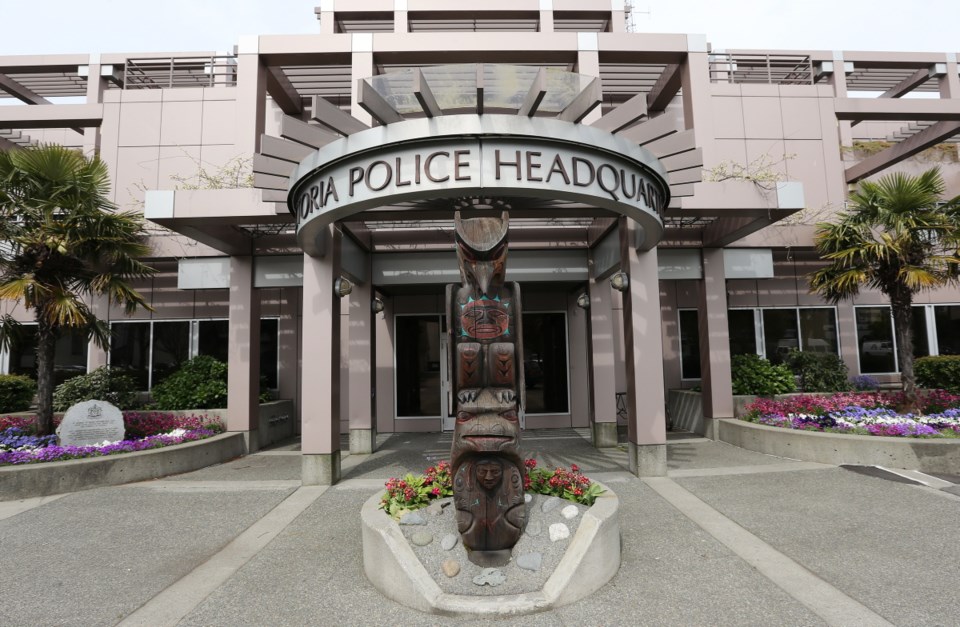The Victoria Police Department moved a step closer Monday to hiring six new officers.
Victoria councillors approved a $528,000 increase to the Victoria-Esquimalt police budget allowing for the hiring of the additional officers.
However, the 5-3 committee vote still has to be ratified by council Thursday night. The budget also needs Esquimalt council approval since that municipality pays about 15 per cent of policing costs.
The increase is about $228,000 less than what had originally been proposed. Savings were largely found by eliminating a proposed executive position for the police board and increased revenue from RCMP for dog service.
VicPD hasn’t had a budget increase since 2010.
Chief Del Manak told councillors his police force deals with regional issues and that calls for service increased 16 per cent between 2012 and 2016.
The department’s officers are dealing with the impact of the opioid overdose crisis more than other jurisdictions in the region and the additional six officers are needed simply to meet demands, he said. He pointed to “downtown core issues, social support services that exist in higher concentration and the amount of liquor seats that are within each jurisdiction” compared to other police agencies within the Capital Regional District.
“The illicit drug overdoses that we’re seeing in record numbers are impacting Victoria police and our residents at a far greater scale than they are our partners in the CRD,” he said.
But not all agreed. Coun. Ben Isitt voted against the increase, saying that Victoria is already the most heavily policed city in the country on a per capita basis and the city should be moving to a smaller police force, not a bigger one.
“We’re not going to police our way out of homelessness and addictions and mental illness. There are other public policy tools and other streams of financial resources that have to be deployed to address those problems in our community,” Isitt said.
Coun. Jeremy Lovely noted a good part of the increased number of calls for service are to deal with mental health and addiction.
“I don’t think we should double down on police officers as first responders for mental health and addiction,” he said. “They are health issues, not criminal issues and I think we would be better off investing in addressing the root causes of these issues.”
Coun Margaret Lucas, who manages a downtown hotel, said that when there are fights, thefts, overdoses, or someone experiencing a mental health issue outside her hotel, she calls the police.
“I don’t call a street nurse. I don’t call a social worker. I don’t call anybody [else] but I call the police. And when they arrive I expect them to be able to deal with the situation at hand,” Lucas said.
Mayor Lisa Helps, who co-chairs the police board with Esquimalt Mayor Barb Desjardins called the budget “very, very challenging.”
“This is expensive. It’s a lot of money. It’s a lot of request at once but there hasn’t been an increase since 2010,” Helps said.
She said there is money available through new assessment revenue.
“It’s for growth. The new assessed revenue is for people moving into our city and they are paying new taxes and they should have the same level of service that residents in 2010 got when we had enough officers to serve the population.”
Esquimalt councillors will review the budget request Jan. 22, said Desjardins.
“The number of police officers being requested and how that comes forward is something that Esquimalt council will likely be looking at very carefully,” Desjardins said, adding that all the reports Esquimalt receives from the police would indicate that crime is on the decline in Esquimalt.
“So the justification of those extra positions will be something that the police board and Del [Manak] will have to really be clear on,” she said.
Meanwhile, councillors also used money from new assessment revenue to reduce the proposed property tax increase to 2.64 per cent from 2.8 and put an additional $421,000 in surplus funds into reserve.



